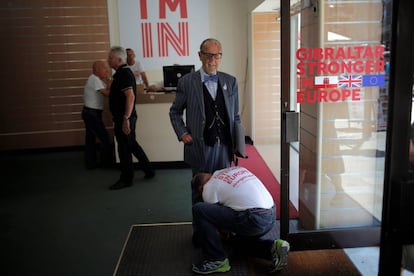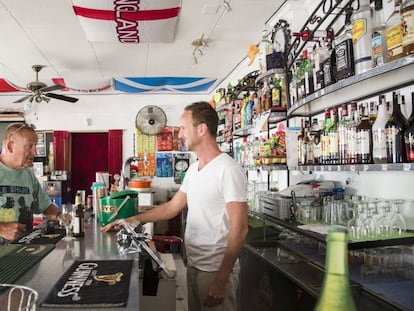Worried Gibraltarians look set to vote to remain in EU
Residents feel that leaving would be economically disastrous and might create further problems with Spain


To some, the upcoming referendum on whether Britain stays in the European Union might not be that big of a deal. But here in Gibraltar, the possibility of a Brexit means the world.
Residents of The Rock are afraid that an ‘Out’ victory will endanger their unique and profitable economy, which has all the advantages of EU membership while simultaneously offering investors significant tax incentives.
Politicians of all stripes and civil society have launched an aggressive campaign to explain to citizens of the territory that it would be a terrible mistake to abandon a market of more than 500 million people. Gibraltarians who still don’t know which way they're going to vote on June 23 must surely be living under a rock.
What would happen to the free circulation of people and goods? How will Spain react? There’s a lot of questions, you know
Bryan Reyes, editor of the Gibraltar Chronicle
There are few places that better represent European influence in Gibraltar than Corks. Formerly an old Irish pub that smelled of beer, it is now a modern restaurant with a colonial look. The owner, Gino Giménez, 45, refurbished the place with EU funds, and when he was done he proudly hung a sign outside the door with the 12 yellow stars against a blue background.
“A Brexit would be a disaster for us, at the economic and the political level,” he says. “I have 14 workers, all of them Spaniards, who come and go every day. What will become of them?”
Tourism, insurance, online gambling (a sector that employs 3,200 people), ship bunkering and financial services drive an economy that barely knows the meaning of the word unemployment. A low corporate tax of 10% and VAT-free shopping keep the engine running, and as a result Gibraltar has barely felt the crisis that has crippled much of the rest of the world.
Sign up for our newsletter
EL PAÍS English Edition has launched a weekly newsletter. Sign up today to receive a selection of our best stories in your inbox every Saturday morning. For full details about how to subscribe, click here.
The idea that all this could come to an end drove lawyer Gemma Vásquez to promote the Stronger in Europe campaign.
“We’ve been self-sufficient for the last 30 years. That comes from the fact that we have implemented EU regulations,” says Vásquez, who feels confident that her message has reached every one of the 30,000 llanitos who live here.
Gibraltar’s Main Street looks a lot like an airport terminal: there are duty-free stores on both sides selling tobacco products, watches and electronic devices. Halfway down the thoroughfare, a portrait of Elizabeth II presides the entrance to an old Franciscan convent. This is where the representative of the British Crown, Lieutenant General Edward Davis, resides. A police officer wearing glasses and sporting an enormous tattoo on one arm is guarding the building.
— Would it be possible to know the governor’s opinion on Brexit?
— No, that’s not possible.
— What about the queen’s opinion?
— Try the phone.
Right across from here is Jury’s Café, where Chief Minister Fabian Picardo is enjoying a cup of coffee. The head of the Gibraltar Socialist Labour Party feels that Brexit would be a disaster to the British Overseas Territory's economy, and fears that without European laws to protect it, Spain might close off access to pressure for its return.
In his mind, that would be detrimental to both nations. “Every day, 10,000 people cross the border, 7,000 of them Spanish. We are an economic engine of growth in the region, the second most important factory in Andalusia after the Junta [regional government],” he says.
Picardo adds that Gibraltarians are massively supporting Brimain after hearing Spanish Foreign Minister José Manuel García-Margallo state that if Brexit prospers, Spain will ask Britain for shared sovereignty over The Rock.
We’ve been self-sufficient for the last 30 years. That comes from the fact that we have implemented EU regulations
Gemma Vásquez, lawyer
“I’d like to take this opportunity to thank Mr Margallo for helping me out so much with the campaign. He made it easy,” says Picardo. “Don’t laugh, I really mean that.”
— Some polls are forecasting a very tight result. In such a scenario, the Gibraltarian vote, though small, could be decisive.
— In that case, many generations of Britons would be thankful to us.
But there are those on Gibraltar who back leaving the EU. John Bromfield, a 71-year-old businessman who exports building materials, supports Brexit and believes there are many more people who secretly think like him, but are afraid of speaking out in public for fear of appearing to be “unpatriotic.”
The surveys published by the Gibraltar Chronicle do not support his view. The only street poll conducted in Gibraltar asked 596 people whether they will vote and which way. The results suggest a turnout of over 85% and more than 88% of voters in favor of remaining in the EU.
Bryan Reyes, the newspaper's editor, underscores the uncertainty of a Brexit for entrepreneurs.
“What would happen to the free circulation of people and goods? How will Spain react? There’s a lot of questions, you know,” he says.
And then there are those who are undecided. Lawyer Charles Gómez claims that the EU is “very dangerous,” and expresses concern over border controls and a political elite that controls European institutions. But as Gómez exemplifies, Gibraltarians are above all practical: despite his dislike of the EU, the economic risks associated with Brexit makes him hesitate. When all is said and done, business is business.
English version by Susana Urra.









































